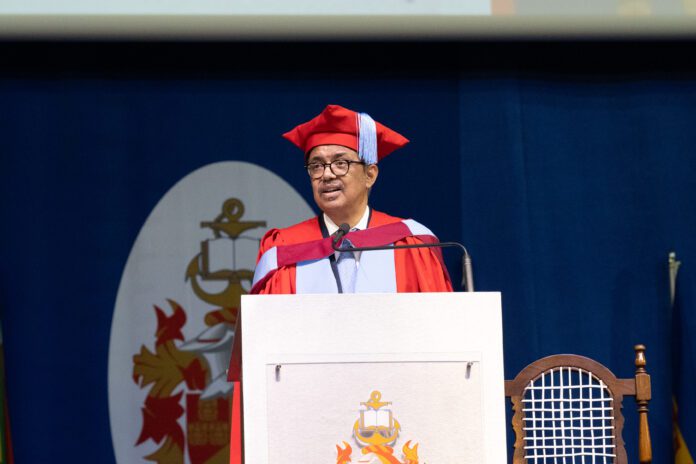The first African to head the World Health Organization and former minister of health of Ethiopia, Dr Tedros Adhanom Ghebreyesus, was awarded an honorary doctorate by the University of Pretoria on Friday.
Ghebreyesus who was elected WHO director-general in 2017 – making him the first person from the WHO African Region to head the world’s leading public health agency – was honoured for his role as a global health expert, scholar, advocate, and diplomat.
Ghebreyesus is a malaria expert with a Ph.D. in community health from the University of Nottingham in the UK. He also has a Master of Science in immunology of infectious diseases from the University of London and a Bachelor of Biology from the University of Asmara.
The 58-year-old – who attended the graduation ceremony accompanied by this wife and two children – was part of the School of Medicine graduations which conferred Bachelor of Medicine and Surgery (MBChB) degrees and postgraduate degrees to a total of 557 graduates.
“It is a privilege for the University of Pretoria to honour such an outstanding health leader for his many and significant contributions, which span three decades,” said Professor Tiaan de Jager, dean of the Faculty of Health Sciences in a statement issued by the university on Saturday.
Speaking during his acceptance speech, Ghebreyesus who was re-elected as WHO’s head for a second term last May, paid tribute to former president Nelson Mandela’s unwavering spirit to change the world for the better and to award-winning singer Brenda Fassie, paraphrasing one of her songs as a congratulatory message to new graduates.
Centring his remarks around a few themes – anything is possible; challenges come with opportunities; continuous improvement (change is a constant) and humanity first, Ghebreyesus told the assembly that when he grew up in Ethiopia, he saw the first hand the ravages of violence, poverty and disease in his community.
Emphasising that anything is possible, he said he never imagined that he would one day be a leader of global organisation. “Mother’s prayer was for me to survive just another day,” he said.
Speaking of the challenges, Ghebreyesus said: “When I took on this role as director general of WHO, I did not know that we would soon face an Ebola outbreak in North Kivu in the Democratic Republic of the Congo. This was a place of unrest. In the process we lost two of our colleagues – murdered in cold blood by armed groups who operate in north Kivu.
“Ebola was followed by the Covid-19 pandemic. This was a challenge on many levels … this was a new disease which we had never seen before and it was accompanied by a second pandemic of misinformation and falsehoods,” he said
“The only way to deal with such extraordinary difficulties is to stay focused on your work, following the science and the evidence and to keep the people at the centre of our efforts and that’s what my colleagues and I did throughout the pandemic,” he said.
Ghebreyesus and his team have been in South Africa for the past few days. On Thursday he officially launched the mRNA vaccine technology hub in Cape Town.
He said with the unequal global distribution of life-saving tools like vaccine tests and treatments it was a clear demonstration that the global system was in need of repair and rethinking.
“To address these inequities, WHO partners established the mRNA vaccine technology transfer hub here in South Africa. Local production is critical to preparing for the next pandemic or epidemic,” he said adding that 15 countries from Africa, Latin America, Asia and Europe will be collaborating with South Africa to ensure local production and address the equity issue.
On Saturday Ghebreyesus had a meeting with President Cyril Ramaphosa writing on his Twitter account: “We discussed his Govt’s hosting of the mRNA tech transfer hub to expand local production of vaccines & other medical solutions to help countries meet their health needs.”
Follow @SundayWorldZA on Twitter and @sundayworldza on Instagram, or like our Facebook Page, Sunday World, by clicking here for the latest breaking news in South Africa.



